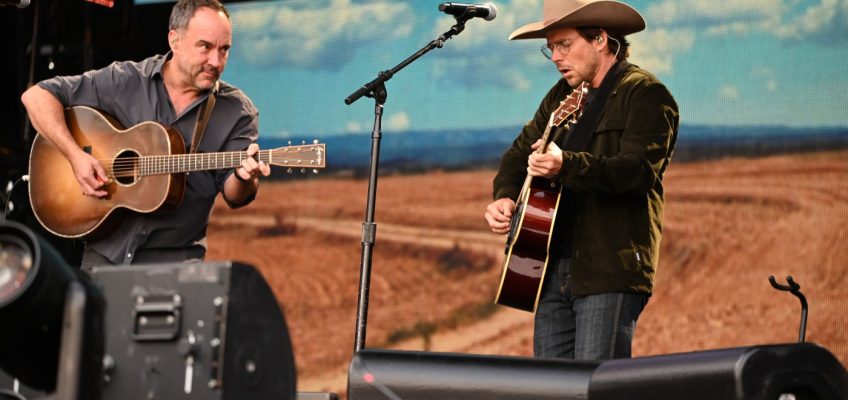Yes, there was plenty of music to be enjoyed at Farm Aid at Huntington Bank Stadium on Saturday, the first time in the organization’s 40-year history that Minnesota has played host.
But at its core, the festival is about building economic and political support for family farmers and sustainable, small-scale agriculture, and that goal was front and center at Farm Aid 40.
During an invitation-only panel discussion before the concert for the media, farmers, organizers and other guests, musicians and Minnesota farmers highlighted the importance of events like Farm Aid in supporting family farmers across the country.
“The face of agriculture is changing, and we have to be able to support everybody who wants to come and do this work, because it’s hard work,” Kelsey Zaavedra, who runs Heirloomista farm in Chisago County and advocates for other young farmers, said during the panel discussion.
Farmers were struggling in the ‘80s, which is what sparked musicians Willie Nelson, Neil Young and John Mellencamp to stage the first Farm Aid in 1985. And farmers are still struggling now, panelists said, with challenges ranging from climate change to global trade policy to corporate consolidation.
“I’ve been farming for a long time, and there’s never been an aspect of farming that wasn’t in crisis,” said southwest Minnesota farmer and Minnesota Department of Agriculture farm advocate Ruth Ann Karty. “We all work together, we belong together, we know what our heritage is and it’s not that we have to do this — it’s that we love to do this.”
The message that uplifting small, independent family farms is inherently and vitally anti-corporate was pervasive throughout the day: Neil Young specifically called out Minnesota-based Cargill during the pre-show panel discussion. Nathaniel Rateliff wore a stop-sign-red “Stop Factory Farms” T-shirt during his set.
Farmers seemed to agree. When it comes to sustainable or ‘regenerative’ agriculture, said Finlayson, Minn., farmer Hannah Bernhardt, “it does give us more power back. We’re not having to spend as much money with corporations. We’re not at their beck and call when we can do things on our own.”
To media and farm advocates assembled before the concert began, Young called for wealthy corporations and individuals to pay a “conscience tax” to support smaller farms, a proposal musician Dave Matthews quickly echoed.
“I’ve been very fortunate in this country to do what I love and be compensated — overcompensated — for doing what I love, so I’m very happy to pay my taxes,” Matthews added, in comments that were later re-broadcast over the loudspeakers to the whole crowd during a set change in the afternoon.
“And I would love my taxes to go to school lunches and after-school programs. I would love my taxes to help pay for the healthcare of people who need it. I would love my taxes to keep family farmers on the land, to help my family and planet stay healthy. I’m not happy to have my taxes pay for tax breaks for billionaires…and I’m not happy for my taxes to be used to bomb children and be complicit in terrible violence and genocide.”
Once the gates opened and the marathon concert began, food politics — and politicians — remained ever-present.
In an outdoor area dubbed the Homegrown Village, local food justice and sustainability organizations like North American Traditional Indigenous Food Systems, Dream of Wild Health and the Land Stewardship Project set up info booths and interactive projects to get attendees involved more long-term.
Early in the afternoon, Rep. Angie Craig of the state’s 2nd Congressional District — who’s the ranking member of the House Agriculture Committee — introduced country singer Wynonna Judd’s set. Later, Sen. Amy Klobuchar took the stage to introduce Margo Price and noted that Price was the final musician to perform on “Jimmy Kimmel Live!” before the late-night show was pulled from the air last week in a decision that has sparked free-speech concerns.
(Price’s opening song on Saturday night, “Don’t Let the Bastards Get You Down,” felt similarly pointed.)
And Gov. Tim Walz made a surprise late-night appearance to introduce the show’s final performer, Willie Nelson, who had reportedly made a personal phone call to the governor earlier this month to help resolve a Teamsters strike that threatened to derail the concert.
Likely referencing that labor dispute, Walz called on the crowd to “give the union sisters and brothers in the stage production crew a big hand,” and he praised “the role of agriculture producers across this country who feed, fuel and clothe not just us in our nation but the world.”
Of Nelson, Walz said the 92-year-old country icon and Farm Aid organizer is “a man who truly embodies the American spirit: Fiercely independent, generous, kind, irreverent, decent and a bit of a hell-raiser.”
During the pre-show event, musician and inaugural Farm Aid performer John Mellencamp was even more explicit, literally and figuratively, about the continued impact Nelson and Farm Aid have on farmers.
“We wouldn’t have raised a (expletive) dime if it wasn’t for him,” Mellencamp said. “We know the Farm Bills they pass in Washington are not for family farms, we know they’re for large agriculture. And we were so naive when we started this, that we thought we’d do one show and they’d pay attention to us.”
Related Articles
Minnesota Ag Weather Network adds 14 new weather stations throughout state
Live Reviews: At Farm Aid 40, an 18-act benefit concert visits MN for the first time
72nd Princess Kay of the Milky Way crowned as MN State Fair begins
Stephen Mihm: America’s corn syrup addiction began with deceit
It’s corn time! Five recipes that highlight the peak summer ingredient


Leave a Reply